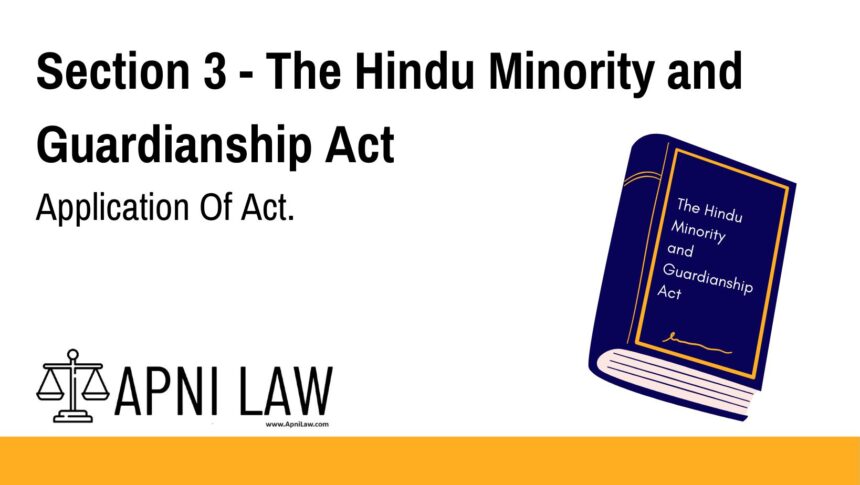Code
Code: Section 3 – Applicability of the Act
(1) This Act applies to:
-
Hindus in all their forms or developments, including Virashaivas, Lingayats, and followers of Brahmo, Prarthana, or Arya Samaj.
-
Buddhists, Jains, and Sikhs by religion.
-
Any other person domiciled in the territories to which the Act extends, who is not a Muslim, Christian, Parsi, or Jew, unless it is proved that such person would not have been governed by Hindu law or custom.
Explanation of Section 3
Section 3 of the Hindu Minority and Guardianship Act, 1956, lays down the scope and applicability of the Act. It defines who is covered under the term “Hindu” for the purposes of this legislation and clarifies which individuals and communities the Act governs.
Key Points:
-
The Act is not restricted solely to those identifying as Hindus in the conventional sense but also extends to sub-sects like Virashaivas and Lingayats.
-
It explicitly includes followers of the reformist movements: Brahmo Samaj, Arya Samaj, and Prarthana Samaj.
-
Buddhists, Jains, and Sikhs are deemed Hindus under this Act for legal purposes.
-
Non-Hindus domiciled in India may fall under this Act unless they prove that Hindu law or custom would not have governed them historically.
Illustration
Example 1: Applicability to a Sikh Family
A Sikh couple living in Delhi is involved in a guardianship dispute regarding their minor child. Even though they are not Hindus by religion in the strictest sense, they fall under the purview of this Act because Sikhs are included under its scope.
Example 2: Exclusion of a Christian Citizen
A Christian man living in Maharashtra is involved in a guardianship issue. He will not be governed by this Act, as Christians are specifically excluded under Section 3 unless proven otherwise.
Example 3: Case of a Non-Muslim, Non-Christian Person
A person from a tribal community, not belonging to any of the excluded religions and domiciled in India, may be covered under this Act unless he demonstrates that he is traditionally governed by customary laws outside the Hindu legal framework.
Common Questions and Answers
1. Who is considered a Hindu under this Act?
The Act considers anyone who is a Hindu by religion, including sects like Virashaivas, Lingayats, Brahmo Samaj, Arya Samaj, Prarthana Samaj, as well as Buddhists, Jains, and Sikhs.
2. Are Muslims and Christians covered under this Act?
No, Muslims, Christians, Parsis, and Jews are explicitly excluded unless they can prove that Hindu law or custom would otherwise govern them.
3. Does this Act apply to NRIs or foreigners?
Only persons domiciled in the territories where the Act extends are covered. NRIs may be excluded unless they meet the domicile requirement and are not part of the excluded religions.
4. Can a person prove non-applicability of the Act?
Yes, a person not belonging to the Hindu religion but domiciled in India may prove that Hindu law or custom would not govern their family or personal matters.
Conclusion
Section 3 of the Hindu Minority and Guardianship Act serves as the foundation for identifying who falls under its jurisdiction. By including a wide range of religious communities and allowing for exceptions based on proof of customary law, the Act ensures flexibility while retaining a clear structure for personal and family law among Hindus and similar groups in India.
For more legal insights, guardianship laws, and expert analysis, visit ApniLaw today!








